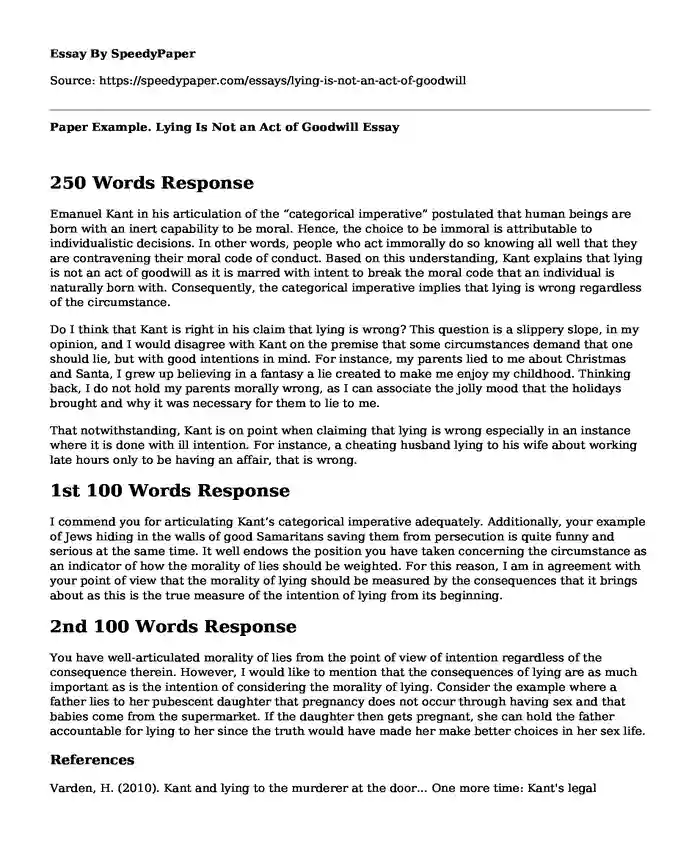
| Type of paper: | Essay |
| Categories: | Ethics Immanuel Kant Human behavior Social issue |
| Pages: | 2 |
| Wordcount: | 489 words |
250 Words Response
Emanuel Kant in his articulation of the “categorical imperative” postulated that human beings are born with an inert capability to be moral. Hence, the choice to be immoral is attributable to individualistic decisions. In other words, people who act immorally do so knowing all well that they are contravening their moral code of conduct. Based on this understanding, Kant explains that lying is not an act of goodwill as it is marred with intent to break the moral code that an individual is naturally born with. Consequently, the categorical imperative implies that lying is wrong regardless of the circumstance.
Do I think that Kant is right in his claim that lying is wrong? This question is a slippery slope, in my opinion, and I would disagree with Kant on the premise that some circumstances demand that one should lie, but with good intentions in mind. For instance, my parents lied to me about Christmas and Santa, I grew up believing in a fantasy a lie created to make me enjoy my childhood. Thinking back, I do not hold my parents morally wrong, as I can associate the jolly mood that the holidays brought and why it was necessary for them to lie to me.
That notwithstanding, Kant is on point when claiming that lying is wrong especially in an instance where it is done with ill intention. For instance, a cheating husband lying to his wife about working late hours only to be having an affair, that is wrong.
1st 100 Words Response
I commend you for articulating Kant’s categorical imperative adequately. Additionally, your example of Jews hiding in the walls of good Samaritans saving them from persecution is quite funny and serious at the same time. It well endows the position you have taken concerning the circumstance as an indicator of how the morality of lies should be weighted. For this reason, I am in agreement with your point of view that the morality of lying should be measured by the consequences that it brings about as this is the true measure of the intention of lying from its beginning.
2nd 100 Words Response
You have well-articulated morality of lies from the point of view of intention regardless of the consequence therein. However, I would like to mention that the consequences of lying are as much important as is the intention of considering the morality of lying. Consider the example where a father lies to her pubescent daughter that pregnancy does not occur through having sex and that babies come from the supermarket. If the daughter then gets pregnant, she can hold the father accountable for lying to her since the truth would have made her make better choices in her sex life.
References
Varden, H. (2010). Kant and lying to the murderer at the door... One more time: Kant's legal philosophy and lies to murderers and Nazis. Journal of Social Philosophy, 41(4), 403-421. doi:https://doi.org/10.1111/j.1467-9833.2010.01507.x
Cite this page
Paper Example. Lying Is Not an Act of Goodwill. (2023, Sep 06). Retrieved from https://speedypaper.net/essays/lying-is-not-an-act-of-goodwill
Request Removal
If you are the original author of this essay and no longer wish to have it published on the SpeedyPaper website, please click below to request its removal:
- Race, Racism, Prejudice, and Discrimination - Free Essay
- Free Essay. Gender Pay Gap As an Ethical Issue
- Essay Sample on Consumer Behavior Change
- Free Essay: The Most Important Piece From the Students' Experiences
- Essay Sample on Social Issues in Database System
- Free Essay Example: Eight Steps to Inclusion
- Free Essay on Philosophy: Implicit Racism
Popular categories




